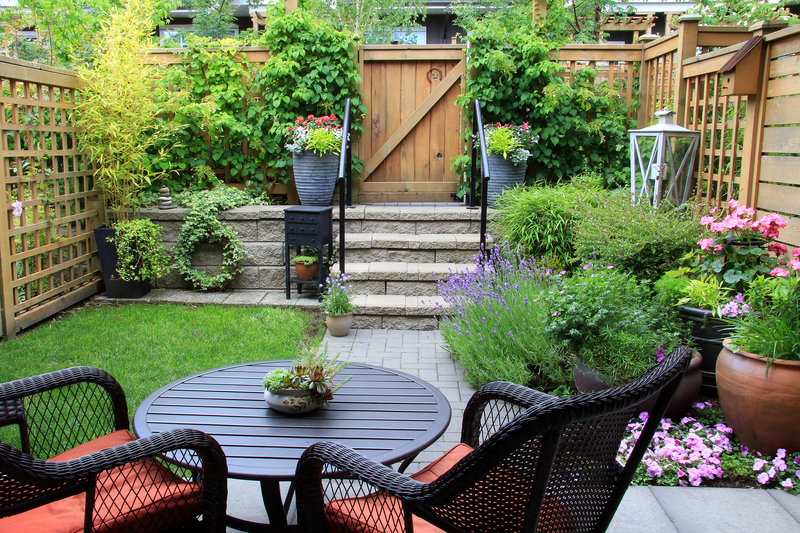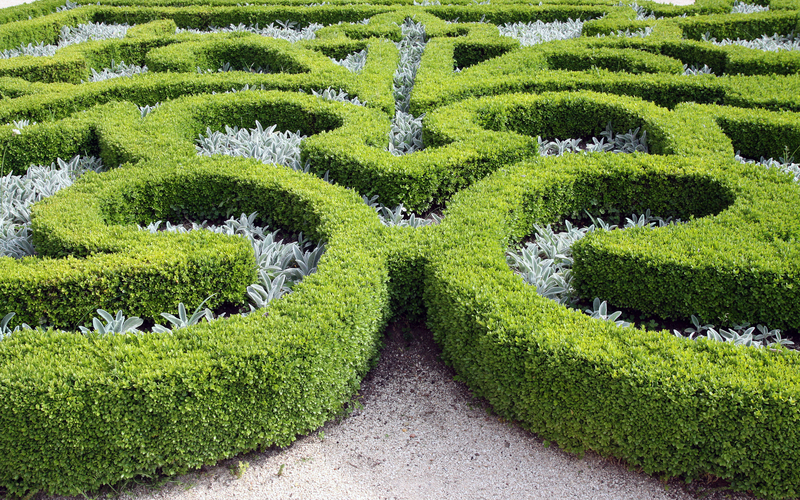Composting: Turning Kitchen Scraps into Garden Gold
Posted on 31/05/2025
Composting: Turning Kitchen Scraps into Garden Gold
Composting has transformed from a simple backyard experiment to an essential part of sustainable living. Homeowners, gardeners, and eco-conscious individuals are discovering the wealth of benefits that lie in those banana peels, coffee grounds, and vegetable trimmings. By turning kitchen scraps into garden gold, you not only reduce your environmental footprint but also create nutrient-rich compost that breathes new life into your garden soil. This comprehensive article will guide you through the process, benefits, and best practices for composting at home.
What is Composting?
Composting is the natural process of recycling organic matter, such as food scraps and yard waste, into a valuable fertilizer that can enrich plants and soil. It is nature's way of breaking down organic materials--using microorganisms, fungi, and invertebrates--to produce a dark, crumbly substance called compost. This process can occur just about anywhere: in your backyard, on a balcony, or even in your kitchen with the right equipment.
Common Terms in Composting
- Greens: Nitrogen-rich materials such as kitchen waste, grass clippings, and coffee grounds.
- Browns: Carbon-rich materials like dried leaves, cardboard, straw, and paper.
- Compost Bin: A container or pile designated for composting organic wastes.
- Finished Compost: The final, nutrient-dense product ready for use in the garden.

Why Should You Compost?
- Reduces landfill waste: Up to 30% of household waste is organic material that could be composted instead of going to the landfill.
- Enriches soil naturally: Compost increases the nutrient content, moisture retention, and overall health of your garden soil.
- Cuts greenhouse gas emissions: Organic waste in landfills releases methane, a potent greenhouse gas. Composting helps curb these emissions.
- Reduces the need for chemical fertilizers: Using compost minimizes reliance on synthetic products that can harm local ecosystems.
- Saves money: Homemade compost reduces the need to purchase soil amendments and fertilizers.
In essence, composting kitchen scraps is an easy, effective way to treat waste as a resource and create a virtuous cycle in your household and garden.
How Does the Composting Process Work?
The decomposition process is driven by microorganisms--primarily bacteria and fungi--as well as worms and insects. By balancing the types of materials you add and providing the right conditions, you can speed up the transformation of kitchen waste into rich, earthy compost.
Key Elements of Successful Composting
- Air (Oxygen): Essential for aerobic decomposition. Turn the compost regularly to provide plenty of oxygen.
- Water (Moisture): Keep the pile damp, like a wrung-out sponge. Too much water makes it soggy and can lead to unpleasant odors.
- Proper Balance of Greens and Browns: Too much nitrogen (greens) and the pile will smell; too much carbon (browns) and it will decompose too slowly.
- Size: Smaller pieces decompose faster. Chop or shred kitchen scraps before composting.
Types of Composting Methods
There are several popular ways to compost kitchen scraps at home, each with its own pros and cons. Choosing the right system depends on your available space, the amount of waste you generate, and personal preference.
1. Traditional Backyard Bin or Pile
- Set up a compost bin or create a pile in a shaded, well-drained area.
- Add alternating layers of greens (kitchen scraps) and browns (leaves, straw) as they accumulate.
- Turn the pile every couple of weeks to aerate.
- Compost is usually ready in 3-9 months.
2. Tumbler Composting
- Compost tumblers enclose organic matter within a rotating drum.
- Easier turning and quicker decomposition (often 4-8 weeks).
- Reduces rodent risk and contains odors.
3. Worm Composting (Vermicomposting)
- Uses red wiggler worms (Eisenia fetida) in a bin to break down food scraps.
- Produces exceptionally nutrient-rich castings (vermicompost).
- Odor-free and suitable for kitchens, balconies, or sheds.
- Great for apartments or homes with little outdoor space.
4. Bokashi (Anaerobic Composting)
- Fermentation-based process using special bran inoculated with beneficial microbes.
- Fits under the sink; handles all food waste including meat and dairy (not always suitable for traditional composting).
- Produces a pre-compost material ready for burial in soil after 2-4 weeks.
Getting Started: How to Compost Your Kitchen Scraps
Ready to turn those peels and leftovers into black gold? Here's a step-by-step guide to composting food waste at home:
Step 1: Choose Your Composting Method and Bin
- Evaluate your space, climate, and the quantity of kitchen scraps produced.
- Pick a suitable bin or compost pile setup--traditional, tumbler, worm bin, or Bokashi.
Step 2: Collect the Right Kitchen Scraps
- YES to compost: Vegetable peelings, fruit scraps, coffee grounds, eggshells, tea bags, old bread, pasta, rice.
- NO to compost: Meat, fish, dairy (unless using Bokashi), oils, greasy foods, diseased plants or pet waste.
- Tip: Keep a small container or compost caddy on your kitchen counter for easy collection.
Step 3: Balance Greens and Browns
- Layer kitchen waste (greens) with 2-3 times as much dry matter (browns) such as leaves, shredded newspaper, or cardboard.
- Each new addition of food scraps should be covered with browns to discourage pests and odor.
Step 4: Maintain Your Compost
- Moisten: Check the pile's moisture level weekly; add water if dry or cover if waterlogged.
- Aerate: Turn or mix the compost every 2-3 weeks to provide oxygen.
- Watch temperature: A warm pile (100-140?F) indicates active decomposition.
- Compost is finished when it's dark, crumbly, and earthy-smelling.
What Can and Can't Go in the Compost?
Knowing what's suitable for kitchen waste composting is crucial for maintaining a healthy, efficient pile.
Compostable Kitchen Items:
- Fruit and vegetable peelings and scraps
- Coffee grounds and coffee filters
- Brewed tea bags (remove staples first)
- Eggshells (crushed)
- Bread, grains, plain pasta, and rice (small amounts)
- Paper napkins, paper towels (unbleached, used for food spills)
- Stale cereal
- Nut shells (except for walnut shells)
Do NOT Compost:
- Meat, poultry, fish, or bones (except in Bokashi systems)
- Dairy products, fats, grease, and oil
- Diseased or insect-infested plants
- Pet wastes (cat, dog litter)
- Glossy or colored paper
- Charcoal ash
- Plastic, glass, or metals
Common Composting Problems and Solutions
Even the best-intentioned composter may experience issues like bad smells, pests, or a slow pile. Here's how to fix the most common headaches:
- Bad odor: Typically caused by excess greens or poor aeration. Solution: Add more browns and turn the pile.
- Pests (mice, raccoons): Avoid composting meat/fish, bury new scraps under browns, use a closed bin.
- Pile too dry: Sprinkle with water and cover with a tarp to retain moisture.
- Pile not decomposing: Mix pile, chop larger items, or add more greens for nitrogen boost.
- Flies: Always cover food scraps thoroughly and avoid adding sugary or oily foods.
How to Use Finished Compost in the Garden
Once your compost is ready, the transformation of kitchen scraps into garden gold is complete! Here are several ways to put your nutrient-rich compost to use:
- Mulch around plants: Apply 1-3 inches on garden beds to retain moisture, suppress weeds, and feed the soil.
- Soil amendment: Work compost into planting areas before transplanting or seeding.
- Top dressing for lawns: Rake a thin layer of compost over grassy areas to promote deeper roots.
- Houseplants: Mix compost into potting soil or add small amounts to indoor containers for a slow nutrient release.
- Compost tea: Steep compost in water and use as a liquid fertilizer for vegetables, flowers, or shrubs.
Tips for Successful Composting All Year Round
- Chop or shred kitchen scraps to speed up breakdown.
- Store browns in a separate pile or container to add throughout the year.
- Keep your compost covered in wet weather to avoid a soggy pile.
- Compost during winter by continuing to add kitchen scraps, then resume turning in spring.
- Be patient! Composting is a natural process--perfectly finished compost may take several months.
Environmental Impact of Composting Kitchen Scraps
Food waste is a global crisis, with millions of tons ending up in landfills. By converting kitchen waste into organic compost, households can:
- Significantly reduce their personal carbon footprint
- Decrease demand for chemical fertilizers and soil amendments
- Improve local ecology by reducing garbage truck pollution and landfill methane
- Support a circular economy approach--where waste becomes a resource
Advanced Composting: Hot Piles, Cold Piles, and Beyond
If you're enthusiastic about composting food scraps and want to experiment further, try these techniques:
Hot Composting
- Build a pile at least 3x3x3 feet for optimal heat retention.
- Monitor temperature; turn more frequently to keep heat up (120-160?F).
- Faster results--finished compost in 1-2 months when managed well.
Cold Composting
- Slower method--simply pile up kitchen and yard waste, turn occasionally.
- Less labor-intensive but may take 6-12 months to decompose fully.
- Useful for busy gardeners or those with less waste.
Composting Myths Debunked
- Composting is smelly. Properly managed compost, with correct proportions of browns and greens, smells earthy--not foul.
- It attracts rats and raccoons. Cover food scraps, avoid meat/dairy, and use a closed bin to discourage wildlife.
- It's complicated. Start simple: add kitchen scraps and yard waste, keep the pile moist and aerated--nature does most of the work.
- You need a big yard. Options like worm bins and Bokashi work in small spaces or even indoors.

Composting Kitchen Scraps: FAQs
1. Can citrus peels and onions be composted?
Yes, in small amounts. Too much citrus or onion can slow down decomposition and affect worm bins. Chop them finely and mix well.
2. How do I avoid maggots or fruit flies?
Always cover fresh food scraps with a thick layer of browns and avoid overloading the pile with fruits.
3. How do I know when compost is ready?
Finished compost is dark, crumbly, and smells like forest soil. No recognizable kitchen scraps should be visible.
Conclusion: Start Composting Today and Create Your Own Garden Gold
Turning kitchen scraps into compost is a transformative journey for your garden, your home, and our planet. Whether you have a big yard, a modest balcony, or just a corner in your kitchen, anyone can take part in composting kitchen waste and turn garbage into greenery. By mastering a few simple steps, you'll not only lower your household waste but also produce a continuous supply of organic fertilizer--true garden gold that will enrich your soil, feed your plants, and support a healthier environment for all.
Start composting today and enjoy the deeply satisfying results that only nature's recycling can provide!
Latest Posts
Garden Success: Strategies to Handle Excessive Wind
Create a serene Zen garden to soothe your senses
Unveiling Effective Ways to Guard Your Garden Against Harsh Weather

